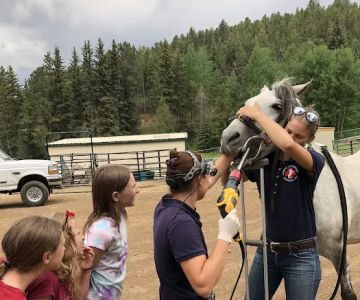How Do I Get Into Veterinary School? A Complete Guide for Aspiring Veterinarians
- 1. Preparatory Steps for Veterinary School
- 2. Academic Requirements for Veterinary School
- 3. Gaining Experience in Veterinary Medicine
- 4. The Veterinary School Application Process
- 5. Tips for Successfully Getting into Veterinary School
- 6. Real-Life Stories of Getting into Veterinary School
1. Preparatory Steps for Veterinary School
Getting into veterinary school is a competitive and challenging process that requires more than just an interest in animals. The path to becoming a veterinarian begins with careful planning and a commitment to excelling academically. Aspiring veterinarians must have a strong foundation in science, especially biology, chemistry, and physics, as these subjects are critical to understanding animal health and medical procedures. Before applying to veterinary school, students need to complete undergraduate coursework that prepares them for the demanding curriculum of veterinary programs.
In addition to coursework, applicants need to build a solid track record of extracurricular activities, including volunteering or working with animals. Gaining real-world experience with animals in veterinary settings is crucial for standing out in the highly competitive veterinary school admissions process. Prospective students should take the time to volunteer at animal shelters, work as veterinary assistants, or gain experience in research labs that involve animal care. These experiences not only enrich a resume but also provide valuable insights into the veterinary profession.
2. Academic Requirements for Veterinary School
While each veterinary school may have slightly different admissions requirements, most programs share common academic prerequisites. Generally, veterinary school applicants must have completed a bachelor’s degree, although some schools accept students with a significant number of completed college credits. The most important factor is having a strong academic record, particularly in the sciences. This includes courses in biology, chemistry, physics, and mathematics. It is essential to perform well in these courses, as veterinary schools use academic performance as a key factor in their selection process.
In addition to academic coursework, many veterinary schools require applicants to take standardized tests like the Graduate Record Examination (GRE). Some schools may also require additional exams, such as the Veterinary College Admission Test (VCAT). These exams assess a candidate’s critical thinking, reasoning, and writing abilities, which are essential for success in veterinary medicine. Therefore, preparing for and performing well on these exams is crucial for increasing your chances of getting into veterinary school.
3. Gaining Experience in Veterinary Medicine
One of the most important factors in the veterinary school admissions process is hands-on experience with animals. Most veterinary schools require applicants to have spent a significant amount of time working with animals in various environments. This experience helps applicants develop the skills and knowledge needed to succeed in veterinary medicine, such as animal care, handling, and understanding animal behavior.
Students can gain experience by volunteering at animal shelters, working as veterinary technicians, or participating in internships that involve animal care. These experiences not only strengthen an application but also provide valuable insight into the realities of working in the veterinary field. Prospective veterinary students should aim to accumulate as many hours of animal-related experience as possible, as this demonstrates both dedication to the profession and a solid understanding of what a career in veterinary medicine entails.
4. The Veterinary School Application Process
The application process for veterinary school is highly competitive and involves more than just submitting transcripts and test scores. Most veterinary schools require applicants to submit a comprehensive application that includes personal statements, letters of recommendation, and a record of their hands-on experience with animals. In addition, some schools may require an interview as part of the selection process.
When preparing your application, it is essential to craft a compelling personal statement that demonstrates your passion for animals and your commitment to pursuing a career in veterinary medicine. Your personal statement should also highlight your academic achievements, relevant work experience, and why you are interested in the specific veterinary programs to which you are applying. Strong letters of recommendation from professors, veterinarians, or supervisors who can speak to your abilities and character are also vital to your application’s success.
5. Tips for Successfully Getting into Veterinary School
Getting into veterinary school requires more than just meeting the basic academic and experiential requirements. The competition is fierce, and applicants must find ways to stand out. Here are a few tips to help increase your chances of being admitted to veterinary school:
- Start Early: Begin preparing for veterinary school well in advance by focusing on your academic performance and gaining experience with animals as early as possible.
- Network with Veterinarians: Building relationships with veterinarians can provide valuable mentorship, guidance, and recommendations for your application.
- Research Schools: Different veterinary schools have unique requirements, so it’s important to research each program thoroughly and tailor your application accordingly.
- Be Persistent: The road to veterinary school can be long and challenging, but persistence and dedication are key. If you don’t get in on your first attempt, try again, and continue building your experience and skills.
6. Real-Life Stories of Getting into Veterinary School
Real stories from current veterinarians can provide valuable insight into the veterinary school application process. Take, for example, Dr. Lisa Harris, a veterinarian who spent four years working as a veterinary technician before applying to veterinary school. “My hands-on experience with animals was invaluable in helping me understand what the profession was really about. It also gave me a leg up when it came to my application. I made sure to highlight my experiences in my personal statement, and I think it really helped me stand out,” Dr. Harris recalls.
Dr. Harris’s story is a reminder that while the academic requirements for veterinary school are important, hands-on experience and a genuine passion for animal care are just as essential. It’s important to dedicate time to gaining real-world experience and to reflect on how this experience will shape your future career as a veterinarian.
As you prepare for veterinary school, keep in mind that the process is competitive but achievable with the right dedication and preparation. Whether you're in the early stages of your educational journey or preparing to apply, remember that hard work, perseverance, and a passion for animal care will guide you toward success in veterinary medicine.











